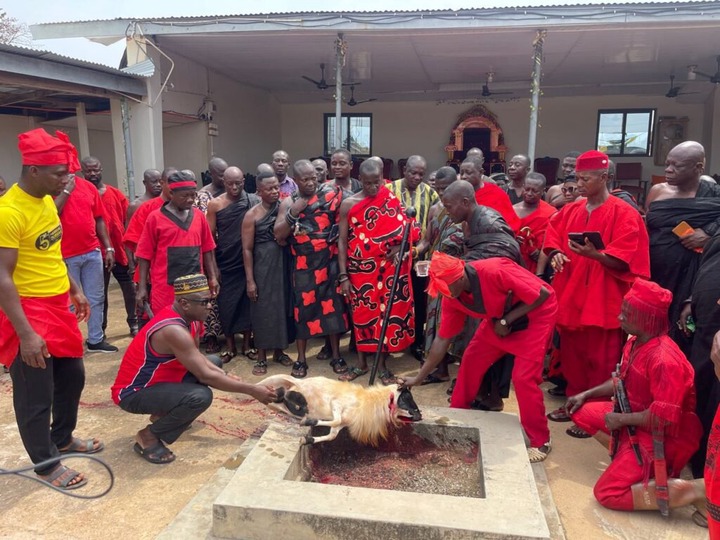In an unprecedented move, the Aowin Traditional Council has performed rituals to banish their Member of Parliament, Oscar Ofori Larbi, from setting foot on any Aowin land.
The decision, announced by the council led by Nana Opong Payin III, Chief of Omanpe, follows accusations that the MP has repeatedly disrespected the traditional authority by spreading false stories about the paramount chief and other divisional chiefs.
The ritual, which involved the slaughtering of a sheep and the pouring of libation, invoked the gods of the Aowin Traditional Area to deal with Larbi should he defy the ban. The council emphasized that while they recognize Larbi’s election by the people, his continued disrespect left them with no choice but to take this drastic step.
The rift between the MP and the traditional leaders stems from allegations of Larbi’s involvement in illegal mining activities within the Tano Anwia Forest Reserve. The council has accused him of exploiting his political position to undermine their authority and operate with impunity on ancestral lands. Larbi, however, has denied these claims, stating that he has actively worked to combat illegal mining in the area.
Nana Payin II, Tufuhene of Enchi, further elaborated on the council’s grievances, revealing that Larbi had ignored three formal invitations to meet with the chiefs. Additionally, the MP allegedly funded a documentary aimed at tarnishing the reputation of the Aowin Omanhene and other chiefs. “It is beyond Nananom’s comprehension that the Honourable MP, who was first elected on the ticket of the NDC, has repeatedly ignored our invitations and openly expressed gross insubordination,” Nana Payin II stated.
The traditional council has made it clear that their actions are not directed at any political party or the government. They have urged that any government-led development projects in the area be channeled through the Regional Minister or the yet-to-be-named Municipal Chief Executive (MCE).
In response to the ban, Larbi has expressed a willingness to resolve the conflict. Speaking over the phone, the MP acknowledged the importance of collaboration with the traditional council for the development of the constituency. “I believe that effective collaboration between me and the traditional council is crucial for the development of the constituency. To achieve this, I’m willing to meet with the council to lift the ban imposed on me,” he said.
Larbi’s commitment to dialogue and reconciliation highlights his dedication to serving his constituents and fostering development in the region. However, the ban raises broader questions about the relationship between traditional authorities and elected officials in Ghana. While traditional leaders hold significant cultural and moral influence, their ability to banish elected representatives underscores the complex interplay between modern governance and traditional norms.
As the situation unfolds, the Aowin constituency remains at the center of a contentious debate over accountability, respect for tradition, and the role of elected leaders in preserving cultural heritage. Whether Larbi can mend fences with the traditional council or whether the ban will stand as a symbol of defiance against perceived political arrogance remains to be seen. For now, the Aowin Traditional Council’s decision serves as a stark reminder of the enduring power of tradition in Ghana’s political landscape.
